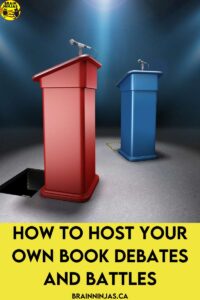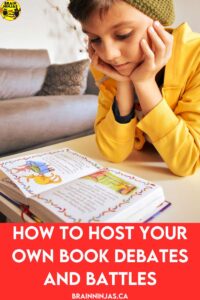
If you live in Canada, you might have heard of Canada Reads. Canada Reads is an annual “battle of the books” competition organized and broadcast by the Canadian Broadcasting Corporation (CBC). We have enjoyed the event for years and thought about how much fun it would be to do the same style of book debates in our classroom. Students love a good battle. Come learn about how it went and how you can host your own book debates.
Choose the Books

Each year, five Canadian books are chosen to be championed by a panel of well-known Canadians. These books can be fiction, poetry, or plays. We’ve also had students argue for magazines, websites, and graphic novel series.
In our classroom, we divided the whole class into groups of five (and one group of six). Within each group, every student had to pick one book they had never read before. We helped them to find books that wouldn’t be too difficult, but would be something new that most of the students would not have read yet.
The books can be in any format. We included novels, graphic novels, picture books, nonfiction books, or anything else students deemed worthy. Priority is given to books that are written by Canadian authors or are published in Canada. Students are given two weeks to read their book and prepare their debate. Some class time is given, but the majority of the reading happens outside of class time since the books can be different lengths.
One place to find up-and-coming books is the YRCA Young Readers’ Choice Awards. We’ve linked to the page from the Edmonton Public Library website, as they automatically update the books and winners each year.
We encourage students to read a variety of genres and formats. This home reading activity might be helpful for students to find the type of book they want to defend. We’ll send the home reading activity right to your inbox when you sign up for our email list. The link includes a French version if you prefer. If you’re already on the list, they can be found in the Resource Library.
Create the Defense

During Canada Reads, each panellist passionately advocates for their chosen book. They highlight its themes, literary merit, and relevance to Canadian society. The panellists on the show are often celebrities for different reasons: athletes, authors, podcasters, actors, broadcasters, singers, and so much more.
We explain to students that they are trying to encourage people to read their books. They need to sell the book, but not give away too much information or plot that people don’t feel like they need to read it because they already know everything about it. We allow our students to take notes or prepare a presentation of their argument so they don’t have to memorize everything.
Students are asked to prepare a two-minute presentation that will be shared at the beginning of the debates. The rest of the debate will be explaining why their book is better than the others.
The Book Debates
On Canada Reads, the panellists engage in lively debates about the books, defending their choices and challenging the other panellists. These debates are broadcast on CBC Radio One.
In our classroom, students debate in front of the class. Each student in the group gets to introduce their book within two minutes. Then, the debate can begin between the group members. We ask students to be respectful, and the teacher acts as a moderator to make sure no students speak over each other. This debate typically lasts five to ten minutes, depending on how much the students have to say.
Students can choose any format for their two minutes. Some students have done a slideshow, and others created a rap song. One student just yelled out a list of words, and while it sounds weird, it was extremely effective because the words chosen were interesting to the class.
The Vote

At the end of each episode of Canada Reads, the panellists vote to eliminate one book from the competition. This process continues until only one book remains.
However, the purpose of this activity is to find the best books to read. We run the vote a little differently. To keep things easy, students are numbered in each group as 1, 2, 3, 4, or 5 (and that extra student is six). We have these numbers written on our whiteboard, and students put their books on the ledge under the numbers.
Everyone sits down and puts their head down to cover their eyes. We call out the numbers one at a time and add up the votes. We write these vote numbers on the board. The highest scores stay in, and the one that doesn’t make it gets put on a chart to keep track of the books. It’s like a reverse countdown, so we write it on the bottom.
The Winner

The last book standing is declared the winner of Canada Reads and is promoted as the book that all Canadians should read.
The top vote-getter of each group has a second debate against each other. This meant there were only four students in the final round. The students who represented the book from each round present it again and debate it. But, this time, audience members can raise their hands and be called on by the teacher to present an argument for or against a book.
Canada Reads is a popular event in Canadian literature. It generates a lot of discussion about books and reading. It often leads to more sales for the featured titles. We experienced the same thing with students requesting the books in our classroom library and school library. This is a great way to have a battle of the books in upper elementary or middle school.
Focus on the passion for reading instead of specifically looking at the books as levels. Help your students fight for the books that students should be reading in your school.
Do you teaching Language Arts?
We have other posts that you might find interesting:
- How to Teach Poetry All Year Long
- How to Teach Types of Sentences and Fix Punctuation Problems
- Unravel the Magic of Fractured Fairy Tale Activities!
- How to Have Fun With Homonyms
- How to Add Some Meat to Your Idioms Lessons
Or try out one of our task card sets. This homophones set features a lesson about types of sentences and the punctuation used for them, along with a set of task cards (paper, Google Slides, and a self-checking Google Forms version). Find them on TpT ($USD) or our BN Shop ($CAN).
How do you encourage a love of reading in your school? We’d love to hear more about it. Leave us a comment below.







